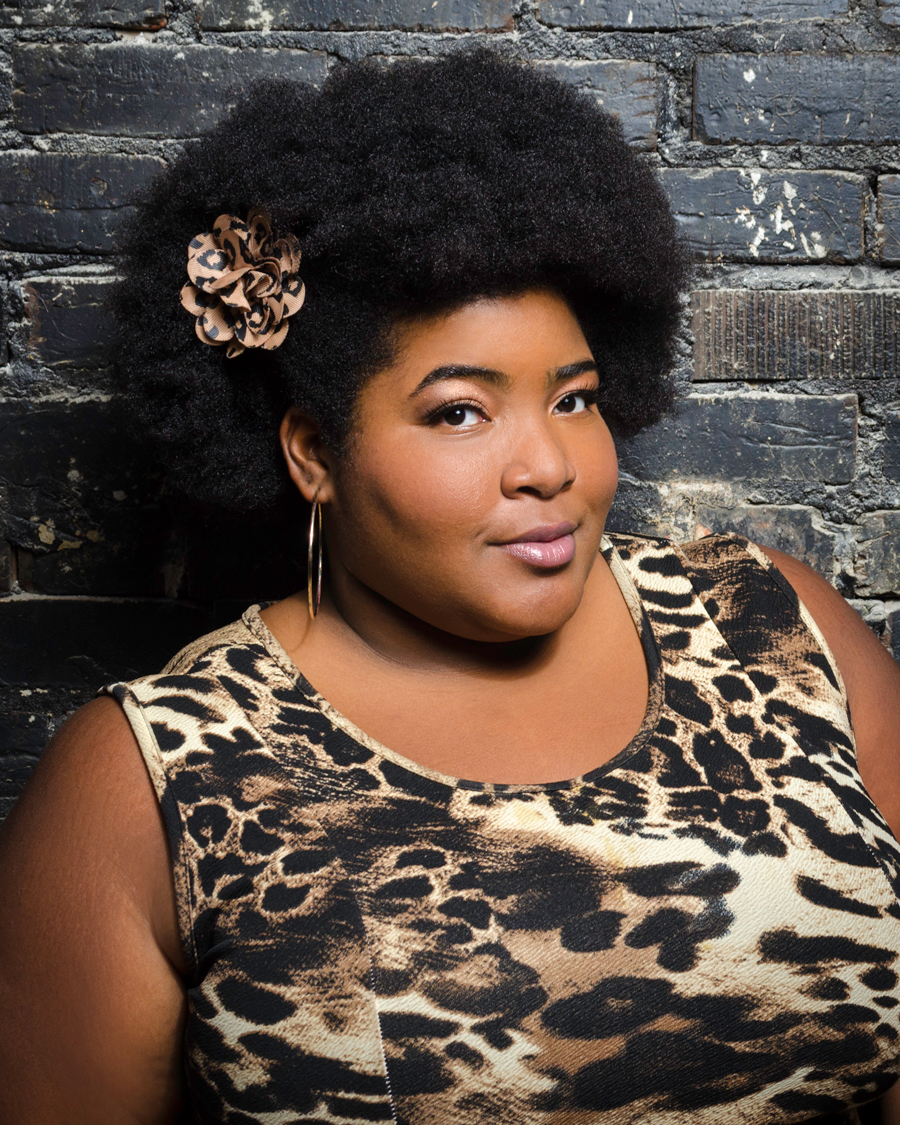
Photograph by Gabriel Michael
There are some things you need to know about Dulce Sloan: she loves theater, hates to run, will decline an invitation to an open mic night, and if she pays $100 for a bra, you’re going to see it. Sloan grew up in Atlanta and joined the cast of The Daily Show with Trevor Noah on Comedy Central earlier this year. Thus far, she has done pieces on cultural appropriation at New York Fashion Week, being a black woman in late-night television, and Chicago Public Schools.
Before moving to New York City, she was a regular on the Atlanta comedy circuit, performing at Laughing Skull Lounge, Funny Farm, and Aurora Theatre, to name a few places. Her veracious take on everything from strangers touching her afro to dating garnered national attention, with appearances on Conan, truTV’s Comedy Knockout, and was named on a 2017 Rolling Stone list of comedians to know.
Growing up in Atlanta and Miami, Sloan pictured herself becoming a serious actress, not a stand-up comedian. She started doing local theater at Ansley Park Playhouse, and after graduating from Norcross’s Meadowcreek High School in 2001, went on to study theater at Brenau University. After college, she started attending comedy shows and eventually got the courage to go up onstage. The rest was destiny.
We chatted with Sloan about working with Trevor Noah, the comedians that inspire her, and lessons she’s learned.
How did you get into comedy?
A friend of mine started working at the Funny Farm, and the comics got to know me when I would go up there to visit her. There was a comic named Big Kenny Johnson who would always ask me to do a set during the open mic. I would always say, “No, I’m not a comic.” And he’d say, “Yes, you are a comic. You know how to tell a good story, you know what a punchline is.” For two years, I ran into him at different events, things that weren’t even related to comedy, and every time I’d see him he would ask me to come to his stand-up class. Finally one day he said I had to take his stand-up class. I told him I didn’t have the money, and he told me I didn’t have to pay. He taught me how to write a joke and how to come up with a set list. So I got into comedy because another comic told me I was a comic.
Why were you hesitant to try stand-up comedy?
Stand-up scared me because I didn’t think I was funny. I just thought I was saying the things that came to my head and people would just laugh at it. I just thought of myself as someone who could tell a good story. When I got into comedy, it scared me because [in theater] when you’re onstage, you’re not yourself and those aren’t your words. When you’re onstage as a comic, that’s you, and those are your words. But your destiny’s your destiny.
Who are some comics you admire?
Margaret Cho—I got to meet her one time at the Laughing Skull, and I could not function. She didn’t know that because I’m an amazing actor. I met her in the green room and then I left and screamed. Once I started doing stand-up, the comics I really grew to love were Maria Bamford [her use of her voice is amazing], Baron Vaughn, and James Adomian. They have a storytelling style, but they do a lot of character work. I come at them with both the love of an actor and a comic.
Tell me about a time you know you killed.
When I did the Laughing Skull Festival in 2015, I was second [to perform] and ended up getting second place in the festival. The guy before me was a New York comic, and he was doing this bit about how women are beautiful and shouldn’t wear makeup and that everyone should be accepting of their bodies—unless they’re fat. When I heard him say that, I thought, “I might not win, but you’re not placing.” I thought about what I could say to piggyback off that to start my set. He was like, “Fat people have different sayings, like more cushion for the pushin’,” and I thought, “Got it.” The audience was not particularly happy that he was making fun of fat women, and I was wearing a leopard print bra that was fully exposed under a red shirt with leopard print pants. I was out and fat and not trying to hear it, so I just got up onstage and said, “I got your cushion motherfucker!” The whole crowd erupted in laughter. Because of that set, I got a manager, I was in the callback round for StandUp NBC (she later won), and I got named [to Montreal’s Just for Laughs New Faces of Comedy Series].
What’s a joke that you’ve told that you love, but that didn’t go over well?
I usually don’t remember those jokes, because if a joke doesn’t work, I get rid of it. There’s a joke I like to tell that some crowds get and some don’t, and I think that’s because it’s a ridiculous concept. Basically I had seen this article about foreskin rejuvenation, about men who were circumcised as babies who wanted their foreskins back. I was like, that doesn’t make any sense. You scorch the earth when you [circumcise]; you can’t get that back. You’re going to one day see some desperate man breaking into a hospital stealing foreskins, but they’re from babies, so it’s not going to [be the right size]. You’ll have to stitch them all together, they’re not going to be all the same color—you’re going to have this technicolor dreamcoat of foreskins. It’s crazy. Sometimes [that joke] hits, sometimes it doesn’t.
How did you get to The Daily Show?
Comedy Central had seen me during a Roast Battle, and my manager and my agent called me one day and said they wanted me to audition for the Daily Show. [I wasn’t sure about auditioning] because I’m not very political, but I am social. I had to send in an audition tape—[the show] sends one piece that is already prepared [for you to perform], and then you have to come up with your own piece on any subject. Mine was about trying to help white people not stumble so much in racial interactions on social media. Like, stop being surprised when one of your friends of color says something happened to them, or just quit being a dick in general. Two days [after I submitted the tape] my manager told me I had to fly to New York to do an audition onstage with Trevor Noah. I had to do a green screen test with the prepared piece and then write another piece—that one was about how hard it is to be black and patriotic, especially for me because my birthday is July 4. I did my audition and left. They called me while I was on my way to the airport and told me I got the job.
How do you temper what you do on the show with your personal politics and make sure what you’re doing is true to you?
I think it’s easy because Trevor is a person of color, so there are a lot of thoughts, feelings, and emotions that I don’t have to explain to him. I don’t really talk about politics, but when you add the social aspect to it . . . I didn’t realize that doing stand-up while wearing an outfit with my bra showing was a type of activism and a way of going against the status quo. I try to come up with ideas that are true to my stand-up. Plus, Trevor challenges us to think of what the other side would think and to try to continue our opinions through the eyes of the other side. It can be funnier that way. I try to find what it is I want to talk about, what it is that I care about, and then talk about it in a way that is funny. With the cultural appropriation piece, that came about because people are always asking me, “Can I say this?” If you’re asking me, you [already] know you can’t.
What is the most important lesson you have learned on The Daily Show so far?
Be careful when you’re booking [stand-up] shows, because you might be stuck in an edit all night and miss your show. I had two shows booked one night and I couldn’t go to either of them. [Once during an edit I was told] that I could leave, but instead I asked, “Are we done yet?” Because I stayed, I was able to learn more about editing. Sometimes you have to cut three minutes off a piece in order to make time, and that can totally change the message you’re trying to get across. So I learned how to [keep] the message you’re trying to say. Even though I can’t make it to every gig, I’m still learning.













